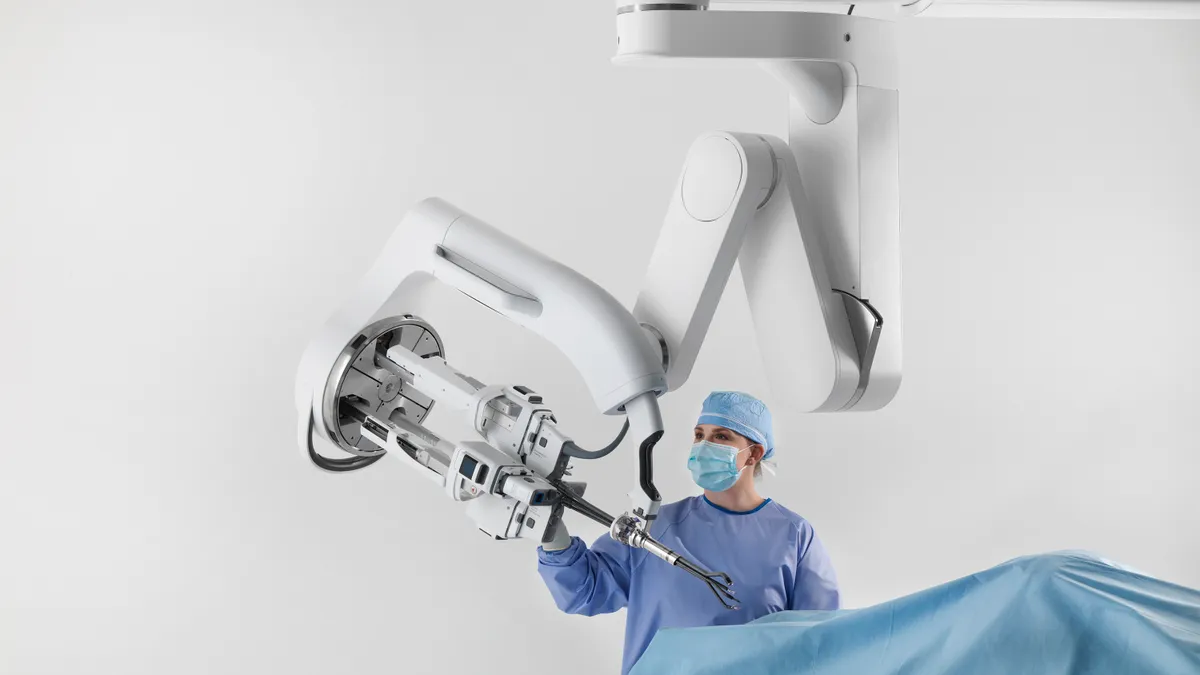Dive Brief:
-
Worldwide procedures using Intuitive’s da Vinci surgical robots returned to growth in the third quarter amid a partial recovery from the disruption caused by the COVID-19 pandemic.
-
Intuitive reported Thursday that mid-single digit growth in the U.S. contributed to a 7% rise in global procedures versus the third quarter of 2019. The increase, which follows a quarter in which procedures fell 19%, ultimately resulted in revenues that were down 4%.
-
Despite the recent improvement in procedure volume, Intuitive expects challenges in the near- to mid-term as hospitals defer spending on new equipment and delays to disease screening create a bottleneck in the pipeline of patients needing surgery.
Dive Insight:
Intuitive was among the first medtech companies to sound the alarm over COVID-19's effects, reflecting the reliance of its business on the types of surgical procedures deferred early in the pandemic. As the coronavirus crisis has dragged on, other threats to Intuitive’s business are evident. The macroeconomic environment and deferral of colonoscopies and tests for prostate cancer are both headwinds for the company.
Those pressures appear in Intuitive’s third-quarter results. Procedures rebounded, led by geographic growth in China and procedure increases in general surgery, but new system placements fell 29% despite sequential improvement over the low of the second quarter. The pushes and pulls on Intuitive’s business added up to a 4% dip in revenues.
Almost half of the year-on-year decline in revenues stemmed from the impact of Intuitive’s Customer Relief Program, through which it has issued service credits. The Extended Use Program that launched earlier this month is another potential headwind. Extended use instruments have 12 to 18 uses, up from 10 originally, and Intuitive is selling some products at a reduced price.
If the program had been in place last year, Intuitive’s revenues would have been $150 million to $170 million lower. Intuitive plans to bring the program to Europe in the fourth quarter and other markets in 2021.
Intuitive is bracing investors for more challenging quarters. On the quarterly results conference call, Intuitive CEO Gary Guthart said the company expects surgery to return to pre-pandemic levels "over the mid-term." Asked by an analyst to define "mid-term," Guthart said "so long as hospital systems are fully in reactive mode with regard to COVID, I think we're in the near term."
The prediction leaves Intuitive at the mercy of the ability of countries and hospitals to manage the pandemic in a way that enables routine healthcare to resume, or in the availability and widespread use of a vaccine that brings the coronavirus crisis under control.
Intuitive may continue to face challenges as the crisis abates. "Many hospitals will seek to absorb existing capacity before installing new capital. Average globally, we continue to expect a challenging near- to mid-term environment for future capital placements as COVID-19 wears on and hospital finances remain strained," Guthart said.
CFO Marshall Mohr also highlighted intensifying competition for the robotic surgery market as another pressure on the company. Mohr said the emergence of competitors may result in "longer selling cycles and price pressures." In China, which has a quota for robotic systems, Mohr said the approval of rival devices in the next year or so may force Intuitive to share the market.
The changing competitive environment is driving a rethink of how Intuitive innovates. To date, Intuitive has relied on in-house R&D to drive organic growth, in part because few other groups were working on robot-assisted surgery. With other groups piling into the sector, Intuitive has set up a $100 million venture capital fund and provided an update on its thinking about M&A.
"We are open-minded to the very bright people outside. We do a lot of activities and tuck-ins over time. Those may get bigger in time. We may continue to do it. In general, I'd prefer to bring things in earlier rather than later. On the other hand, if something is interesting, we are open-minded to it," Guthart said.











